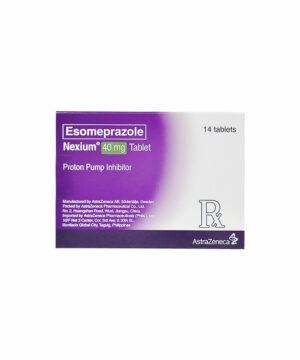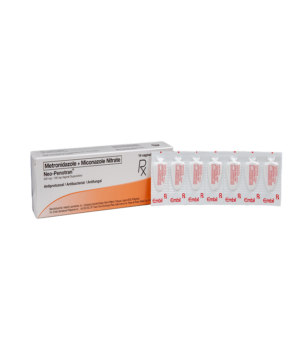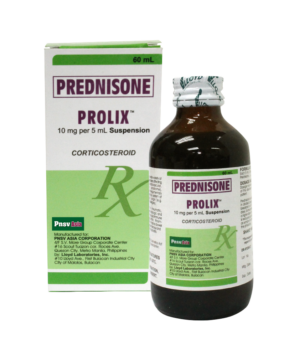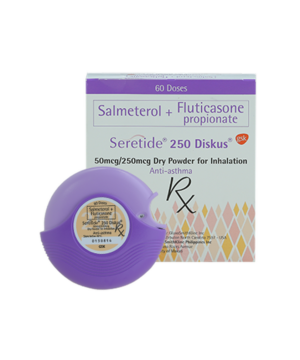Augmentin 457Mg Strw 35Ml
₱336.50
IMPORTANT NOTICE: We require a doctor’s prescription for this product.? Don’t forget to attach a copy of your prescription (.jpeg, .pdf, or .png format) upon checkout, or email it to onlinesales@rosepharmacy.com with your order number! To confirm your order and validate your prescription, our pharmacist will be in touch after you place your order. For a smoother transaction upon delivery, please be ready to present the original copy of your prescription when claiming your order.
Augmentin 457Mg Strw 35Ml
GENERIC NAME: Amoxicillin 400 mg, clavulanic acid 57 mg /5ML
- Applicable for Metro Cebu order
- Credit Card, GCash, Maya, Bank Transfer and COD payment available
- Daily Operations - 8:00 AM to 6:00 PM
- Order Cut-off - 3:00 PM
- Free Shipping for 1,499 and above orders (Visayas & Mindanao)
- For Order below 1,499 delivery fee of 99.00 (less than 1 kilo) will be applied
- For Order below 1,499 delivery fee of 199.00 (1 -3 kilo) will be applied
- Credit Card, GCash, Maya and Bank Transfer payment available
- Description
- Reviews (0)
Description
Augmentin 457Mg Strw 35Ml
Indications / Uses : Amoxicillin-clavulanate should be used in accordance with local official antibiotic-prescribing guidelines and local susceptibility data. Adult Formulations: Co-amoxiclav is indicated for short term treatment of bacterial infections at the following sites when caused by amoxicillin-clavulanate-susceptible organisms: Upper respiratory tract infections (including ENT) e.g. recurrent tonsillitis, sinusitis, otitis media, typically caused by Streptococcus pneumoniae, Haemophilus influenzae#, Moraxella catarrhalis# and Streptococcus pyogenes.
Lower respiratory tract infections e.g. acute exacerbations of chronic bronchitis, lobar and bronchopneumonia, typically caused by Streptococcus pneumoniae, Haemophilus influenzae# and Moraxella catarrhalis#. Genitourinary tract infections e.g. cystitis, urethritis, pyelonephritis and female genital infections typically caused by Enterobacteriaceae# (mainly Escherichia coli#), Staphylococcus saprophyticus and Enterococcus species and gonorrhea caused by Neisseria gonnorhoeae#.
Skin and soft tissue infections typically caused by Staphylococcus aureus#, Streptococcus pyogenes and Bacteroides species#.
Bone and joint infections e.g. osteomyelitis typically caused by Staphylococcus aureus#, where more prolonged therapy may be appropriate.
Other infections e.g. septic abortion, puerperal sepsis, intra-abdominal sepsis.
Pediatric Formulations: Co-amoxiclav is indicated for short term treatment of bacterial infections at the following sites when caused by amoxicillin-clavulanate sensitive organisms: Upper respiratory tract infections (including ENT) e.g. recurrent tonsillitis, sinusitis, otitis media typically caused by Streptococcus pneumoniae, Haemophilus influenzae#, Moraxella catarrhalis# and Streptococcus pyogenes.
Lower respiratory tract infections e.g. acute exacerbations of chronic bronchitis, lobar and bronchopneumonia typically caused by Streptococcus pneumoniae, Haemophilus influenzae# and Moraxella catarrhalis#.
Genitourinary tract infections e.g. cystitis, urethritis, pyelonephritis, female genital infections typically caused by Enterobacteriaceae# (mainly Escherichia coli#), Staphylococcus saprophyticus and Enterococcus species and gonorrhea caused by Neisseria gonorrhoeae#.
Skin and soft tissue infections typically caused by Staphylococcus aureus#, Streptococcus pyogenes and Bacteroides species#.
Amoxicillin-Clavulanate Pediatric Three Times Daily: The pediatric three times daily dosing regimen is also indicated for the following infections: Bone and joint infections e.g. osteomyelitis typically caused by Staphylococcus aureus#, where more prolonged therapy may be appropriate.
Other infections e.g. septic abortion, puerperal sepsis, intra-abdominal sepsis.
All Formulations: A comprehensive list of sensitive organisms is provided in Microbiology under Actions.
#Some members of these species of bacteria produce beta-lactamase, rendering them insensitive to amoxicillin alone (see Pharmacology: Pharmacodynamics under Actions).
Susceptibility to amoxicillin-clavulanate will vary with geography and time. Local susceptibility data should be consulted where available, and microbiological sampling and susceptibility testing performed where necessary.
Infection caused by amoxicillin-susceptible organisms are amenable to Co-amoxiclav (Augmentin) treatment due to its amoxicillin content. Mixed infections caused by amoxicillin-susceptible organisms in conjunction with amoxicillin-clavulanate-susceptible beta-lactamase-producing organisms may therefore be treated with Co-amoxiclav (Augmentin).
Injection: Co-amoxiclav (Augmentin) intravenous is also indicated for prophylaxis against infection which may be associated with major surgical procedures such as gastrointestinal, pelvic, head and neck, cardiac, renal, joint replacement and biliary tract.
Administration : May be taken with or without food: May be given w/o regard to meals. Best taken at the start of meals for better absorption & to reduce GI discomfort.
Contraindications : Co-amoxiclav (Augmentin) is contraindicated in patients with a history of hypersensitivity to beta-lactams e.g. penicillins and cephalosporins; in patients with a previous history of amoxicillin-clavulanate-associated jaundice/hepatic dysfunction.
Special Precautions :
Before initiating therapy with Co-amoxiclav (Augmentin), careful enquiry should be made concerning previous hypersensitivity reactions to penicillins, cephalosporins, or other allergens.
Serious and occasionally fatal hypersensitivity (anaphylactoid) reactions have been reported in patients on penicillin therapy. These reactions are more likely to occur in individuals with a history of penicillin hypersensitivity. If an allergic reaction occurs, Co-amoxiclav (Augmentin) therapy should be discontinued and appropriate alternative therapy instituted. Serious anaphylactoid reactions require immediate emergency treatment with adrenaline. Oxygen, IV steroids and airway management, including intubation may also be required.
Co-amoxiclav (Augmentin) should be avoided if infectious mononucleosis is suspected since the occurrence of a morbilliform rash has been associated with this condition following the use of amoxicillin.
Prolonged use may also occasionally result in overgrowth of non-susceptible organisms.
Pseudomembranous colitis has been reported with the use of antibiotics and may range in severity from mild to life-threatening. Therefore, it is important to consider its diagnosis in patients who develop diarrhoea during or after antibiotic use. If prolonged or significant diarrhoea occurs or the patient experiences abdominal cramps, treatment should be discontinued immediately and the patient investigated further.
In general, co-amoxiclav is well tolerated and possesses the characteristic low toxicity of the penicillin group of antibiotics. Periodic assessment of organ system functions, including renal, hepatic and haematopoietic function is advisable during prolonged therapy.
Abnormal prolongation of prothrombin time (increased INR) has been reported rarely in patients receiving amoxicillin-clavulanate and oral anticoagulants. Appropriate monitoring should be undertaken when anticoagulants are prescribed concurrently. Adjustments in the dose of oral anticoagulants may be necessary to maintain the desired level of anticoagulation.
Changes in liver function tests have been observed in some patients receiving Co-amoxiclav (Augmentin). The clinical significance of these changes is uncertain but Co-amoxiclav (Augmentin) should be used with caution in patients with evidence of hepatic dysfunction.
Cholestatic jaundice, which may be severe, but is usually reversible, has been reported rarely. Signs and symptoms may not become apparent for up to six weeks after treatment has ceased.
In patients with renal impairment, dosage should be adjusted according to the degree of impairment (see Renal Impairment under Dosage & Administration).
In patients with reduced urine output, crystalluria has been observed very rarely, predominantly with parenteral therapy. During the administration of high doses of amoxicillin, it is advisable to maintain adequate fluid intake and urinary output in order to reduce the possibility of amoxicillin crystalluria (see Overdosage).
Co-amoxiclav Suspensions/Sachets/Chewable tablets (where applicable), contains aspartame, which is a source of phenylalanine and should be used with caution in patients with phenylketonuria.
Effects on Ability to Drive and Use Machines: Adverse effects on the ability to drive or operate machinery have not been observed.
Be the first to review “Augmentin 457Mg Strw 35Ml”
You must be logged in to post a review.




















Reviews
There are no reviews yet.